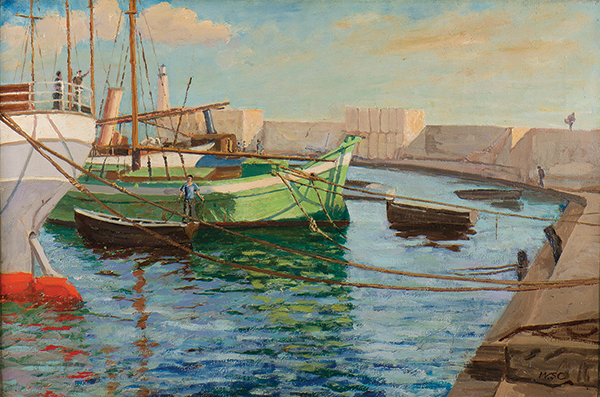As prime minister of the United Kingdom, Sir Winston Churchill helped Allied Forces win World War II. When he wasn’t making history, Churchill made art, 500-plus paintings that led the Royal Academy of Arts to name him an Honorary Academician Extraordinary in 1948.
Of Churchill’s canvasses, the London daily newspaper “The Telegraph” in 2014 wrote that “the great statesman was a sensitive, serious and accomplished artist” who “well understood the complexities of form, perspective and composition.”
Art lovers – and history and military buffs – can assess a sampling of Churchill’s paintings for themselves at the Hilliard University Art Museum on the University of Louisiana at Lafayette campus. The “Art of Sir Winston Churchill” runs through March 21. The exhibit is organized by America’s National Churchill Museum at Westminster College in Fulton, Mo.
Churchill’s granddaughter, Emma Soames, joined University faculty members, historians and art experts who ushered in the recent opening of the exhibit during “Churchill in Conflict and Culture: A Symposium.” The Jan. 17 event at the LITE Center on the UL Lafayette campus was organized by the National WWII Museum in New Orleans.
“I had wrongly assumed that in popular culture the memory of Churchill and his works would be fading by now, more than 50 years after his death,” Soames said during the symposium. “So, it is wonderful that there is still such a desire to…find that Hollywood and historians continue to burrow into the many extraordinary aspects of his life.”
One of those extraordinary aspects – Churchill’s painting – is often overlooked, a footnote to an extraordinary life, Tim Riley, director and chief curator of the National Churchill Museum at Westminster College, told symposium attendees.
“Winston Churchill is well-known as a statesman, a leader, a military commander, a soldier. He’s not always known as an artist…but an exhibition like this one allows us to take a deep dive into this lesser known part of a well-known man.”
Painting provided a respite from the burdens of office for Churchill throughout his long public service career. Dr. Keith Huxen, senior director of research and history at the National WWII Museum, said during the symposium that Churchill once told a friend: “If it weren’t for painting, I couldn’t live. I couldn’t bear the strain of things.”
Churchill – who according to many biographies and accounts told boyhood classmate Sir Muirland Evans in 1891 that he would one day be a military commander and save England from disaster – couldn’t entirely forget about the battlefield, however, even standing at an easel.
Case in point: Dr. Allison Leigh, an assistant professor of art history at UL Lafayette, referenced Churchill’s 1921 essay “Painting as a Pastime” during the symposium. She said that “one of the first things that struck me in the text was (Churchill’s) declaration that ‘painting a picture is like fighting a battle.’”
Churchill further wrote: “In all battles, two things are usually required of the commander in chief. To make a good plan for his army, and secondly, to keep a strong reserve. Both these are also obligatory upon the painter.”
Save for a cannon on a beach here, or a battleship there, Churchill largely avoided depicting the ugliness of war. Most of his work featured landscapes or seascapes, although he did some interior scenes and portraits. The artist, who favored bright, vivid colors, was influenced by Impressionists such as Monet.
Soames, however, said her grandfather drew the greatest inspiration from Chartwell, his home of almost 40 years in the countryside of Kent, near London. He spent leisure time, especially in his later years, painting on the bucolic grounds and in his studio at the sprawling estate.
“Chartwell was captured by his brush in all seasons and in all its moods. Above all it was the view from Chartwell that I think inspired so much of what he did. He used to sit for hours as an old man as I remember him in his Stetson hat with cigar in hand looking out across the Weald of Kent,” she said.
Learn more about the Hilliard University Art Museum, its exhibits and programs.
Image credit: Sir Winston S. Churchill. Boats at Cannes Harbor, 1937. Oil on canvas. America’s National Churchill Museum. Gift of the New York State Chapter of the Friends of America’s National Churchill Museum. © Churchill Heritage Ltd
